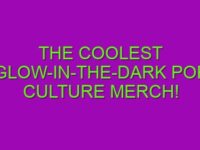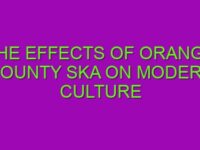-
Table of Contents
The Influence of Alternative Rock on Fashion Trends
Alternative rock has had a profound impact on modern culture, influencing various aspects of society, including fashion trends. The rebellious and non-conformist nature of alternative rock has resonated with individuals seeking to express their individuality through their clothing choices. As a result, alternative rock has played a significant role in shaping fashion trends and pushing the boundaries of mainstream style.
One of the most notable ways in which alternative rock has influenced fashion is through its rejection of traditional gender norms. Alternative rock artists have often challenged societal expectations by blurring the lines between masculine and feminine fashion. This has led to the rise of androgynous styles, with both men and women embracing clothing that defies traditional gender roles. The androgynous look, characterized by loose-fitting clothing, layered ensembles, and a mix of masculine and feminine elements, has become a staple in alternative fashion.
Furthermore, alternative rock has also been instrumental in popularizing the grunge aesthetic. Originating in the 1990s, grunge fashion is characterized by its casual and unkempt appearance. Inspired by the music and attitude of alternative rock bands like Nirvana and Pearl Jam, grunge fashion often includes ripped jeans, flannel shirts, oversized sweaters, and combat boots. This laid-back and effortlessly cool style has become synonymous with alternative rock and has been embraced by fashion enthusiasts worldwide.
In addition to challenging gender norms and popularizing the grunge aesthetic, alternative rock has also influenced the use of band merchandise as a fashion statement. Fans of alternative rock bands often proudly display their allegiance by wearing t-shirts, hoodies, and accessories featuring their favorite artists. This trend has not only become a way for fans to express their musical preferences but has also become a fashion statement in its own right. Band merchandise has become a staple in alternative fashion, with individuals incorporating these items into their everyday outfits to showcase their love for alternative rock.
Moreover, alternative rock has also had a significant impact on the use of unconventional materials and DIY fashion. The DIY (do-it-yourself) ethos of alternative rock has inspired individuals to create their own unique clothing pieces using unconventional materials and techniques. This has led to the rise of upcycling, where individuals repurpose old clothing or materials to create new and innovative fashion pieces. The use of unconventional materials, such as recycled fabrics, vinyl records, and even duct tape, has become a hallmark of alternative fashion, reflecting the rebellious and creative spirit of alternative rock.
In conclusion, alternative rock has had a profound influence on fashion trends in modern culture. Its rejection of traditional gender norms, popularization of the grunge aesthetic, and promotion of band merchandise as a fashion statement have all contributed to shaping alternative fashion. Additionally, the DIY ethos of alternative rock has inspired individuals to experiment with unconventional materials and create their own unique fashion pieces. As alternative rock continues to evolve, it is likely that its impact on fashion trends will continue to be felt, pushing the boundaries of mainstream style and encouraging individuals to express their individuality through their clothing choices.
Alternative Rock’s Impact on Music Festivals and Concert Culture
Alternative Rock’s Impact on Music Festivals and Concert Culture
Alternative rock, with its unique sound and rebellious spirit, has had a profound impact on modern culture. One area where this influence is particularly evident is in the realm of music festivals and concert culture. These events have become a breeding ground for alternative rock bands to showcase their talent and connect with their fan base. In this article, we will explore the effects of alternative rock on music festivals and concert culture, highlighting the ways in which this genre has shaped and transformed these events.
One of the most significant ways in which alternative rock has impacted music festivals and concert culture is by diversifying the lineup. In the past, festivals were often dominated by mainstream pop and rock acts. However, alternative rock’s rise to prominence has led to a more eclectic mix of artists being featured at these events. This has allowed for a greater variety of musical styles and genres to be represented, appealing to a broader audience. As a result, music festivals have become more inclusive and have attracted a more diverse crowd.
Furthermore, alternative rock’s influence on music festivals and concert culture can be seen in the way these events are organized and marketed. Traditionally, festivals were centered around a single genre or theme. However, alternative rock’s popularity has led to the emergence of alternative-focused festivals, catering specifically to fans of this genre. These festivals often feature alternative rock bands as headliners and offer a range of activities and experiences that cater to the alternative music community. This has created a sense of community and belonging among alternative rock fans, fostering a unique concert culture that is distinct from mainstream events.
Another way in which alternative rock has impacted music festivals and concert culture is through its emphasis on live performances. Alternative rock bands are known for their energetic and passionate stage presence, which has become a defining characteristic of the genre. This has influenced the way concerts and festivals are experienced, with a greater emphasis on the live performance aspect. As a result, music festivals have become more than just a platform for artists to showcase their music; they have become immersive experiences that allow fans to connect with their favorite bands on a deeper level.
Moreover, alternative rock’s impact on music festivals and concert culture can be seen in the way these events have evolved to incorporate visual and multimedia elements. Alternative rock bands often incorporate visual projections, lighting effects, and other multimedia elements into their performances, creating a multi-sensory experience for the audience. This has influenced the production value of music festivals, with organizers investing in state-of-the-art stage setups and visual effects to enhance the overall experience. As a result, music festivals have become more than just a series of concerts; they have become immersive spectacles that engage and captivate the audience.
In conclusion, alternative rock has had a profound impact on music festivals and concert culture. From diversifying the lineup to creating a sense of community among fans, this genre has transformed these events into immersive experiences that go beyond just the music. By emphasizing live performances and incorporating visual and multimedia elements, alternative rock has shaped the way we experience and appreciate music festivals. As this genre continues to evolve and push boundaries, it is likely that its influence on music festivals and concert culture will only continue to grow.
Alternative Rock’s Role in Shaping Social and Political Movements
Alternative Rock’s Role in Shaping Social and Political Movements
Alternative rock, with its rebellious and non-conformist spirit, has played a significant role in shaping social and political movements throughout modern history. This genre of music emerged in the 1980s as a response to the mainstream rock scene, offering a fresh and distinct sound that resonated with a generation seeking change and authenticity. From its early beginnings to its current influence, alternative rock has been a catalyst for social and political activism, challenging the status quo and giving a voice to the marginalized.
One of the defining characteristics of alternative rock is its ability to address social and political issues head-on. Unlike mainstream pop music, which often focuses on love and personal experiences, alternative rock artists have used their platform to shed light on pressing societal concerns. Through their lyrics and music, they have tackled topics such as inequality, environmental degradation, war, and human rights abuses. By doing so, they have sparked conversations and raised awareness among their listeners, inspiring them to take action and effect change.
Moreover, alternative rock has provided a sense of belonging and community for those who feel marginalized or misunderstood. The genre’s emphasis on individuality and non-conformity has attracted a diverse fan base, including those who identify as outsiders or rebels. This sense of unity has often translated into collective action, as alternative rock fans have come together to support causes and advocate for social justice. Concerts and music festivals have become platforms for activism, where like-minded individuals can gather, share ideas, and mobilize for change.
In addition to its impact on social movements, alternative rock has also influenced political discourse. Many artists have used their music as a means to criticize government policies, challenge authority, and express dissent. Through their songs, they have provided a voice for those who feel unheard or oppressed by the system. This has been particularly evident during times of political turmoil, such as the anti-establishment movements of the 1990s or the protests against war and inequality in the early 2000s. Alternative rock has served as a soundtrack for these movements, amplifying their messages and giving them a sense of urgency.
Furthermore, alternative rock has been instrumental in breaking down barriers and challenging societal norms. The genre’s rejection of mainstream conventions has paved the way for artists to explore unconventional themes and experiment with different musical styles. This has allowed for greater diversity and inclusivity within the music industry, as artists from various backgrounds and identities have found a platform to express themselves authentically. By challenging traditional gender roles, advocating for LGBTQ+ rights, and addressing issues of race and ethnicity, alternative rock has contributed to a more inclusive and progressive society.
In conclusion, alternative rock has played a crucial role in shaping social and political movements throughout modern history. Its ability to address pressing issues, foster a sense of community, and challenge the status quo has made it a powerful force for change. By providing a platform for marginalized voices and inspiring collective action, alternative rock has left an indelible mark on modern culture. As the genre continues to evolve, it will undoubtedly continue to shape social and political discourse, reminding us of the power of music to inspire and transform.



















